
by Steve | Sep 15, 2017 | Magazine, Magazine Articles, September/October 2017

Rob Bell, HarperOne.
By David F. Watson-
Rob Bell is one of the most innovative and effective communicators in Western Christianity. His work on the NOOMA videos, the rapid growth of Mars Hill Church, and the popularity of his books all demonstrate his ability to convey complex ideas in accessible ways. Bell writes in a conversational style that draws the reader into the world of creative ideas he inhabits. He is a grammarian’s nightmare, but in an age in which popular writing is more beholden to the blogosphere than to Turabian, Bell has been able to speak to people who will never darken the door of a theological library.
His newest offering is ambitiously titled, What is the Bible? How an Ancient Library of Poems, Letters, and Stories Can Transform the Way You Think and Feel About Everything. The book comprises four main sections, the first three of which consist mostly of his own interpretations of biblical texts. In the fourth section, he attempts to answer some key interpretive questions about issues such as the violence in Scripture, the inspiration of Scripture, and its authority. A brief fifth section includes annotated endnotes.
Bell’s best moments in this book occur in the first three sections during his sermonic interpretations of Scripture. He knows the content of the Bible well. One could argue with some of his historical assertions and the conclusions he draws from them, but he has done his homework. He understands the value of historical and literary exegesis, but he never allows the technical work that supports his reading to overshadow his intent to communicate accessibly and clearly. At times he works theologically with Scripture in ways that are eye-opening, surprising, and provocative.
Despite these high moments, the book is marked by serious theological and interpretive problems. Perhaps the most significant of these is his attempt to disconnect the Bible from the Church. He states in the introduction that “the Bible isn’t a Christian book.” Rather, it is “a book about what it means to be human.” He fleshes out this understanding of the Bible throughout much of what follows.
Yes, the Bible is, at least in part, about what it means to be human. To assert that the Bible is not a Christian book, however, is simply wrong. If one means the Old and New Testaments together, the Bible is very much a Christian book. The Old Testament was adopted in its Greek form by the early church. The New Testament was written by some of the earliest followers of Jesus, drawing upon ideas developed in early Christian communities. The selection of books that would become the Christian canon took place within churches. These books were selected, at least in part, because of their usefulness in teaching the faith of the Church. It is the Church that has preserved and proclaimed the Bible over the long history of our faith. By any reasonable definition, historical or theological, the Bible is a Christian book. Why, then, would Bell claim otherwise?
To answer this question, we need to unpack his notion of divine revelation. “So is the Bible the word of God?” he asks. “Yes. Lots of things are,” including “the heavens and the stars” as well as “the mouth of a baby,” “your conscience,” and “poets and philosophers.” Here Bell draws on the biblical tradition that God can be known from creation. “The heavens proclaim the glory of God; the skies proclaim the work of his hands,” says the psalmist (19:1).
Does creation, however, make God known to us in the same way that the Bible does? It is useful here to recall the distinction between general and special revelation. Bell strongly emphasizes general revelation — what we can discern about God and our lives from observing the world around us. For example, we might look upon the beauty and order of the world and derive from these that there is a God, a good God who values order rather than chaos.
What we can’t derive from observations like these, though, are truths such as that God so loved the world that he gave his only Son, that anyone who believes in him will not perish but have eternal life (John 3:16). We could not derive the election of Israel, the necessity of Christ’s atoning work on the cross, or the resurrection of the dead. These require special revelation, the kind we find in the Bible. So, yes, stars and babies and our consciences do in fact testify to us about God, but not in the same way as the Bible does. General revelation can only take us so far. We need special revelation to get to the core claims of Christian faith. If Bell does see special revelation at work in the Bible, he makes little mention of it.
Because Bell largely ignores special revelation, there is no sense that the Bible teaches the “faith once and for all delivered to the saints” 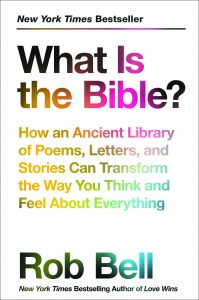 (Jude 3). Rather, its purpose is to teach us universal truths about the nature of human existence. Take, for example, his summary of Paul’s message: “The apostle Paul is stoking a movement, spreading this intoxicating message that there’s another way to be in the world, that the good news of Jesus is about human dignity and goodness.” How he determines this to be Paul’s central message is a mystery. Much more prominent in Paul’s writings are themes of human sinfulness, the salvation available to us through Christ’s death on the cross, and our resurrection from the dead, of which Christ is the firstfruits. Bell criticizes readers of the Bible who are “constantly comparing what they’re reading to what they have already decided about who God is and what God is like.” In this case, one might respond with the old proverb, “Physician, heal thyself.”
(Jude 3). Rather, its purpose is to teach us universal truths about the nature of human existence. Take, for example, his summary of Paul’s message: “The apostle Paul is stoking a movement, spreading this intoxicating message that there’s another way to be in the world, that the good news of Jesus is about human dignity and goodness.” How he determines this to be Paul’s central message is a mystery. Much more prominent in Paul’s writings are themes of human sinfulness, the salvation available to us through Christ’s death on the cross, and our resurrection from the dead, of which Christ is the firstfruits. Bell criticizes readers of the Bible who are “constantly comparing what they’re reading to what they have already decided about who God is and what God is like.” In this case, one might respond with the old proverb, “Physician, heal thyself.”
Bell repeatedly asserts that the Bible is a “progressive” book that teaches us about the universal nature of human existence. Chapter 30 asks the question, “Why is Leviticus in the Bible?” Rather than answering this question theologically or even historically, Bell reaches for psychology. The offerings and rituals required in Leviticus helped people relate to God, he asserts. They helped them feel at peace with God, to know where they stood. All the “endless details” in Leviticus had “a significant calming effect, reassuring you that you’re doing it correctly and not bringing unnecessary judgment on yourself.” Leviticus, he explains, is a step on the way to a better understanding of the relationship between God and humankind. “It was a revolutionary step forward in human consciousness at that time, inviting people to consider a whole new conception of the divine.” Later in the book, he applies these ideas to the death of Jesus: “God didn’t set up the sacrificial system. People did.” He continues, “The sacrificial system evolved as humans developed rituals and rites to help them deal with their guilt and fear. (This is why the book Leviticus is so radical and progressive — in it you can actually know where you stand with God, you can have peace with God, a truly revolutionary idea at the time).” And just like that, the entire Israelite sacrificial system, the significance of the temple, the priesthood, and Christian atonement vanish in a flash of stunning reductionism. One wonders why the rest of the Bible should not suffer the same fate.
In fact, it does. “When you read the Bible in its context,” he writes, “you learn that it’s a library of radically progressive books, calling humanity forward into a better future.” Particularly in the fourth section of the book, it becomes clear that Bell is deeply beholden to the liberal doctrine of progress: we as human beings are getting better and better as time goes on. We are progressing in terms of scientific knowledge, our understanding of human nature, and our views of right and wrong. The Bible is valuable because it testifies to this progress. It demonstrates the moral and spiritual development of the people of Israel and the first followers of Jesus as they came to apprehend the universal truths available all around them. As Bell puts it, “The Bible is a reflection of a growing and expanding human consciousness.”
He repeatedly exhorts readers to wrestle with the text, sit with its ambiguity, and let it speak to them afresh. “I want you to read the Bible in a whole new way,” he writes. Ironically, he has very little new to offer in this book. His interpretive strategies are simply rehashings of various currents of liberal Protestantism. Scripture teaches us timeless truths. The Bible is inspired, but only in the same way that you or I might be inspired. The authority of Scripture is only as great as we allow it to be. The Bible is a human book. Atonement is a human invention. For those of us in the so-called “mainline” traditions, these kinds of assertions are old hat. Another book reasserting them, no matter how interesting the prose or creative the presentation, is of little use.
David F. Watson is the academic dean at United Theological Seminary in Dayton, Ohio. He is the author, most recently, of Scripture and the Life of God: Reading the Bible to Grow in Faith (Seedbed).

by Steve | Sep 15, 2017 | Magazine, Magazine Articles, September/October 2017
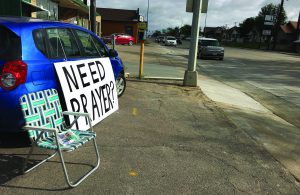
Photo courtesy of Adam Weber and Embrace Church.
By Adam Weber-
This summer I felt like I was supposed to pray for random people. Strangers.
Okay, God, what are you telling me to do? I wound up making a four-by-eight-foot sign with the words “Need prayer?” Then I put it in my car and drove to the busiest road in Sioux Falls. I set the sign against the side of my car and sat on a lawn chair beside it. I couldn’t have felt more awkward. And for me, that’s saying a lot. I kept thinking, There is no way people are going to stop. But they did.
A college girl stopped on her way to school. “I’m running late for class, and it’s my final test of the semester. But when I saw the sign, I felt like I was supposed to stop. Can you pray for me?”
Another person stopped and asked if he could pray for me. I didn’t expect that. The man asked me for specific things he could pray for and then he prayed. I was so encouraged by his simple, heartfelt words.
On another day, I was finishing up, putting the sign back in my car, when a vehicle stopped. A younger lady slowly stepped out. She gently walked over to me and said, “I have MS. A few weeks back, I fell, and since then I’ve needed to use a cane. It’s been difficult. But this morning when I woke up, I was able to walk without a cane again. I’m so thankful and excited. Right now I’m headed to see my doctor, but when I saw your sign, I felt like I needed to stop. I just want to pray and thank God that I can walk today wlthout a cane.” Little did she know how much she encouraged me.
Sitting on the side of the road with a sign felt awkward, yet I’m glad I did it. It encouraged me, and I hope it encouraged others.
Throughout a “normal” day, I often pray for people sporadically. Sometimes it’s for a stranger I cross paths with at Target or a person who randomly comes to mind on my way to work or before calling it a night. It’s a gift to pray for those people and ask God that they have a week filled with joy, that they grow in their walk with the Lord, or that they come to know God’s purpose for their lives.
Some folks keep a list of names. Others pray as God reminds them of people throughout the day. I often write a person’s name down in my Bible. It reminds me to pray for that person, either for a specific need or just because.
Sometimes I pray words of comfort for a relative who’s going through a difficult season. Other times I pray words of encouragement for a person who I know has a job interview.
Sometimes I pray for strength for a friend battling cancer.
A few months back, a staff person of Embrace, a young mom who had become well known and well loved by many people within our church, received some of the most difficult news imaginable. After a few weeks of having a cold that wouldn’t go away, the doctors believed it might be a case of pneumonia. They found something much worse. Stage 4 lung cancer. Bomb dropped. I’ve never seen an entire church so shell-shocked. I’ve also never seen a family more surrounded, loved, and lifted up in prayer. People wanted to help, wanted to support her, wanted to cheer her on, and they did. But more than that, people began to pray. Among other things, a nonstop chain of prayer began that continues today. There are hundreds, if not thousands, of people consistently and faithfully praying for Shannon; her husband, Dave; and the kids.
When I first spoke with Shannon after the diagnosis, she shared about one of her first PET scans. Forty minutes of lying completely still, not being able to move, while holding her arms above her head. It was extremely uncomfortable for Shannon due to the cancer. She tried so hard not to cough, even though her lungs were irritated. This is what she later shared:
“As I was lying there, a peace came over me that I couldn’t explain. I couldn’t help but think about all of the people from all over the country who were praying for me at that exact moment. I was overwhelmed in the best way possible and was reminded that I wasn’t alone. God and his people were with me and for me, cheering me on. We all have hard stuff that we face, and this was mine. But I wasn’t alone. The calls, texts, e-mails, and words of people praying reminded me of this.”
Here’s one very practical piece of advice about praying for others: if you tell someone you’re going to pray for him or her, do it! For years, I struggled with the bad habit of telling people I would pray for them but never getting around to doing so. I would simply forget. So often “I’ll pray for you” is something we say when we don’t know what else to say. It’s something we e-mail people. Something we write in sympathy cards. We type it as a comment on a friend’s Facebook post. We’re quick to say it but struggle to follow through on it.
I didn’t want my words to be hollow, so I made a simple change. Now if I tell someone I am going to pray for him or her, I ask if I can pray right then and there, or else I silently pray as we part ways. There are other ways to act on this. My wife will often set a daily reminder on her phone to pray for a certain person at a specific time so she doesn’t forget.
It might feel strange at first, to pray for someone audibly, but it’s amazing the impact our words have when talking with God on someone else’s behalf.
Encourage. Comfort. Strengthen. Cheer. Pray for one another.
Adam Weber is the founder and lead pastor of Embrace, a United Methodist congregation with six campuses around Sioux Falls, South Dakota. He is the author of Talking With God: What to Say When You Don’t Know How to Pray (Waterbrook). This article is excerpted by permission from that book.

by Steve | Sep 15, 2017 | Magazine, Magazine Articles, September/October 2017

Members of the newest United Methodist congregation in Dubai, Oasis of Grace, meet for worship in a hotel room on Friday afternoons. Photo courtesy of Thomas Kemper and the General Board of Global Ministries.
By Thomas Kemper-
Witness to faith in Jesus Christ takes many forms and can be found in unexpected places — such as the United Arab Emirates (UAE), where Oasis of Grace United Methodist Church is one of the newest congregations in our denominational connection. The vital and vibrant church meets in a hotel in the officially Muslim country; it is an expression of the devotion of United Methodist migrant workers from the Philippines.
I was honored to worship there and take part in the installation of its first leadership team late during the Lenten season this year. I was in the UAE for the tenth anniversary of the First United Methodist Church in Dubai and to show that Global Ministries is walking with United Methodists and other Christians there. Oasis of Grace, launched last November, has a congregation of approximately 50 people.
First Church Dubai, Oasis of Grace, and a third congregation I had the chance to visit, Sharjah United Methodist Church, were started by Filipino United Methodists who come in large numbers to work in the prosperous, oil-rich kingdoms along the Persian Gulf. They bring the church with them and are allowed—in the UAE—to gather for worship, although Emirati Muslims are not allowed to come to the services or convert to Christianity. Another United Methodist community, which I was unable to visit, has been organized by migrant church members from Zimbabwe.
Though often facing peril, migrants have long played a positive role in the spread of the gospel of Jesus Christ — to the “ends of the earth,” as Acts 1 states. They are a blessing to God’s mission. This is true today not only with respect to those from the Philippines in the Middle East but also with United Methodist migrants from Africa reaching Europe and North America.
Methodist newcomers from Africa are helping to enliven congregations in Germany, Italy, and Ireland, and to start new congregations in western Canada.
To a large degree, Methodism is and always has been a migrant movement, and missionaries from New Testament days have crossed tremendous boundaries to share the good news.
The Migrant Church in the UAE. The UAE is a federation of seven absolute Islamic monarchies. Only about 15 percent of the total population of nine million is comprised of indigenous Emirati citizens, who are required to profess Islam. With some 85 percent of the people being migrant workers, concessions to other religious groups are imperative. The constitution allows limited free expression of religion to immigrants. Of the total population, some 27 percent are Hindu, mostly from India; Christians about 10 percent, mostly from various parts of Asia.
The two things that most inspired me about my visits with the Filipino United Methodists in the UAE were their powerful sense of community and their dependence on lay leadership. The United Methodist community is family. The First Church anniversary service bulletin spelled it out: “Praising, worshipping, and serving as United Methodist family.” Children are plentiful in the congregations. In true Methodist fashion, serving is important. The “family” has outreach to residents of huge labor camps outside of town, offering legal advice to other migrants and helping those who might be mistreated by employers to find redress.
Most congregations are led by lay pastors who also have regular jobs. The pastor of Sharjah church is an auto mechanic. Oasis of Grace is led by a sales executive. The Filipino churches in the UAE are under the jurisdiction of the episcopal area of Manila. I joined Bishop Ciriaco Francisco on the visit, along with the Rev. Rico Esguerra, superintendent of the Manila District whose territory also includes the UAE where he visits on a regular basis.
My brief trip to the UAE included “Palm Friday.” Sunday is just another work day. All worship is on Friday, the weekly holy day of Islam — and whether Protestant services can be on Friday depends on whether a congregation can find a space for worship. First Church’s anniversary service was on a Friday afternoon at the Anglican Holy Trinity Church. I met with Oasis of Grace in the middle of the day at the Cassells Hotel, Al Barsha, and the Sharjah church in the evening at St. Martin’s Anglican.
No Permanent Sanctuaries. First Methodist Church Dubai has worshipped in many spaces throughout its ten years. While some religious groups have regular churches or temples, that is generally not the case with small Protestant fellowships such as United Methodists. Our congregations borrow or rent space, First Church currently at Holy Trinity Anglican parish and Sharjah at St. Martin’s. Both Anglican churches are part of the Diocese of Cyprus and the Gulf. The Anglican Church has a strong presence in the UAE stemming from British economic interests in the late nineteenth and early twentieth centuries.
St. Martin’s is a particularly interesting case study in broad ecumenical space-sharing. The Rev. Drew Wayne, the priest in charge of the

Ancient mosques meet modern temples in Dubai, UAE. Photo courtesy of Thomas Kemper and GBGM.
Anglican facility, told me that 127 different guest congregations use the center, which has rooms that can accommodate from 50 to 1,000 persons and was enlarged in 2013 to accommodate a growing number of groups. Father Wayne said that the ruling emir told him to “facilitate Christian services,” and he took the mandate seriously. The Anglicans provide only a sound system and a podium. Sharjah United Methodist Church brings and takes away after worship its Christian symbols and equipment. There is no storage area.
Health Concerns. Dubai, one of the best known of the emirates, is a futuristic city with amazing architecture, including the world’s tallest building, a kind of modern wonderland. The UAE, despite human rights and equity issues arising from its mixture of religious and secular law, puts a high priority on health services. It has a privatized, yet universal, health insurance system. Health care is free for citizens and insurance is a shared expense for migrant employers and employees. All migrants must be part of the system.
The emirates have reached out to health care providers from outside the country. The outpatient Valiant Clinic, opened in Dubai last year, is administered by Houston Methodist Hospital. Along with local United Methodist leaders, I visited the state-of-the-art clinic on City Walk while there, as it seems one of the very few places where the word Methodist is publicly displayed. We received a warm welcome, and yes, the Methodist connection is alive and vibrant and in sometimes very unexpected places.
Thomas Kemper is general secretary of the General Board of Global Ministries. Reprinted by permission.
![After the Reformation]()
by Steve | Sep 15, 2017 | Magazine, Magazine Articles, September/October 2017
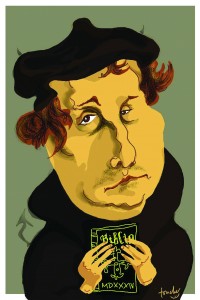
Original portrait of Martin Luther by Anton Tonchev.
By Justus Hunter-
I once read through the first 30 years of Christianity Today. My professor wanted to know how evangelicals were thinking about Roman Catholicism. In the basement of the library, I huddled over microfilm, back aching, inhaling mold and dust, and discovered … very little. When I came back with little to show, my professor was surprised. There were articles on the Second Vatican Council, but they were mostly informational, explaining the developments to American evangelicals. Nothing juicy.
I tried to console him with pages of withering criticism for the World Council of Churches. He decided evangelicals just couldn’t be bothered with Rome. Silently, I thought otherwise. After all, Christianity Today was founded by Billy Graham, a friend of the Kennedys, a man who reported Pope John Paul II whispered in his ear, “We are brothers.”
Graham was just the beginning. In 1994, Charles Colson and Fr. Richard John Neuhaus co-signed the document “Evangelicals and Catholics Together.” The document was endorsed by prominent Methodist theologians Thomas C. Oden and Billy Abraham. Two years ago, Lifeway Resources reported over half of evangelical pastors in America view Pope Francis as their “brother in Christ.”
American evangelicals have developed an appreciation for Rome. We should welcome these transitions. In the years to come, evangelicals and Catholics will find common cause. We will work to preserve our traditions. We can help one another. After all, Rome made me a better Methodist.
I am an evangelical Methodist. My grandparents and parents are all evangelical Methodists. My parents met when my dad became the youth pastor at my mom’s home church, Weaver First United Methodist Church in Weaver, Alabama. Camp meetings were a fixture of our summers. All the spiritual guides of my early years knew how to linger at the altar.
As a child, the purpose of the church was clear to me: to make people holy. Of course, it was equally clear that not everyone in my church was a saint. I was, after all, a pastor’s kid. Waking early, I would find my dad on his knees. I know he prayed for patience. Like raising three boys at home, raising saints at church comes with frustration.
That there are many sinners in a congregation is no surprise. The Son of Man came to seek and save the lost (Luke 19:10). We don’t quit a gym because it has flabby members. But if its faithful members get flabbier, we would ask for a refund. The question for the church isn’t whether or not sinners are there, but does it reliably make them holy? Can its way to holiness be trusted?
Once again, I am an evangelical Methodist. I follow the Methodist way to holiness. But I also spent several years studying under leading Roman Catholic theologians. Over the years, I have come to appreciate the Roman way to holiness. Surprisingly, coming to appreciate the Roman way to holiness pushed me deeper into Methodism.
Five hundred years ago, in 1517, a professor of theology penned ninety-five “theses” for debate. Professor Luther hoped for an academic debate about the buying and selling of indulgences. He set off the Reformation. Over the following years, from 1517 to 1521, Martin Luther found himself embroiled in refutation and litigation.
As Archilochus said, “While the fox knows many things, the hedgehog knows one great thing.” Utter dependence was Luther’s one great thing. He held to it with the tenacity of a tucked hedgehog. We utterly depend upon God for our creation. We utterly depend upon God for our continued life. When it comes to our salvation, the repair of our fallen state, our remarkable partaking in God’s nature (2 Peter 1:4), our dependence is all the more profound – it is utter. Luther taught utter dependence using the language of Paul: justification by grace through faith (Ephesians 2:8).
In Luther’s day, the Christian tradition possessed two great theologians of utter dependence: St. Paul and Augustine of Hippo. Luther, an Augustinian monk commenting on Paul’s letter to the Romans, followed them with characteristic resolve. Between 1517 and 1521, Luther connected utter dependence to the practice of selling indulgences to gain time off purgatory. To buy and sell indulgences was to deny utter dependence; there are no transactions when dependence is utter. Luther held to utter dependence with such confidence that he refused to recant, even at the cost of excommunication. His refusal set off the Protestant Reformation, and Christianity in the West was changed.
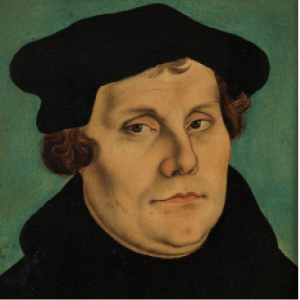
Martin Luther (1529) by Lucas Cranach the Elder.
What we often call the Reformation was, in fact, several reformations. Luther’s reformation in Northern Germany was distinct from Calvin’s reformation in France and Zwingli’s in Switzerland. Over time, the church that excommunicated Luther, what we now call the Roman Catholic Church, reformed as well.
Remarkably, in 1999 Lutherans and Catholics reached a common understanding on justification by grace through faith, Luther’s utter dependence. The “Joint Declaration on the Doctrine of Justification” clarified the common understanding, and withdrew the Reformation-era condemnations of Rome by Lutherans and Lutherans by Rome. Methodists were quick to sign off on the document, seeing in it a confirmation of John Wesley’s own view of justification and grace.
England was the reformed soil of Methodism. There, reformation took shifting forms. The Church of England began with tumultuous transition between monarchs: Henry VIII, Edward VI, Mary I, Elizabeth I. Early on, it was infused with the spirit of Puritanism, with verve for purifying the church of any and all “catholic” sensibilities. And yet, the Church of England retained many of those sensibilities. The Church of England is a tradition between.
Like the Church of England, Methodism is a tradition between. Ours is an evangelical tradition, but one that practices infant baptism. Laity have equal voice in establishing discipline, but they employ bishops to bring about their vision. In America, Methodism has long been an odd fit in the Protestant landscape: too evangelical for mainliners, and too mainline for evangelicals.
In the new world, Methodist between-ness sounded un-Protestant. From its founding, Methodism in America set about distinguishing itself from prominent forms of Calvinism. Our historic emphasis on holiness and on sanctification, to ears trained by Calvinist Orthodoxy, sounded like works righteousness. Methodists were charged with diverging from Paul, Augustine, Luther, and Calvin. They betrayed the central insight of the reformation: utter dependence.
John Wesley saw this challenge coming. His most scathing attacks were directed at Calvinist misunderstandings of the Reformers’ central insights. Wesley was unyielding in his rejection of the Calvinist view of God, to the point of calling their god “worse than the devil” in “Free Grace.”
Wesley vehemently denied that Methodists lost the reformation emphasis on utter dependence. His most thorough description of the Methodist doctrine of grace, “The Scripture Way of Salvation,” is clear that our only hope of salvation is dependence upon God’s grace. Repentance, admitting our hopelessness apart from God’s work, is the fitting posture to receive grace. But that repentance is God’s work in our lives. By grace, God leads us to repentance. And so the first word for Wesley was always grace: grace for repentance, grace for justification, grace for sanctification, grace for further repentance, grace for entire sanctification.
Luther’s resolve for utter dependence remains in Wesley’s thought and in Methodist doctrine. Indeed, the marks that set us apart from our evangelical brothers and sisters, our practice of infant baptism and insistence upon real presence, speak to our commitment to utter dependence. What better way to avoid thinking of faith as a work than to insist upon the baptism of infants? What better way to practice utter dependence than partaking in the body and blood of Christ made present? Wesley saw these connections between the Reformed doctrine of grace and the Anglican approach to sacraments.
Wesley’s genius was the integration of doctrine and practices. He was studied in doctrine and wise about the Christian life. Wesley developed this wisdom, theologically, into his unique way of salvation – the Wesleyan via salutis. That Wesleyan way grew out of Wesley’s reflection on the Christian life, on the practices that shape it, on the goal God has for it. Wesley’s doctrine of grace is lasting because it is integrated and effective. It draws together the whole of Christian life and practice. It leads to holiness.
I did not realize how deeply Christian these Wesleyan impulses were until, as a graduate student, I made a close study of Thomas Aquinas’s Summa Theologiae. In seminary, we were taught that Wesley was a practical theologian. It was occasionally whispered, with some embarrassment, he was a folk theologian.
When I came to Aquinas’s treatment of the sacraments, I realized that Wesley’s attention to practices for developing his doctrine of grace was a venerable Christian tradition. Rome’s theology of grace is developed, not in the forms of a Protestant way of salvation, but in reflection on the sacraments. For Rome, the sacraments unfold as a path for the pilgrim on the way to heaven. A journey begun at baptism continues by communion and confession. Similarly, Wesley insists that the baptized commune regularly and confess their sins to one another. Wesley’s band and class meetings, largely responsible for Methodism’s success, are a retrieval of the practice of confession, in Protestant form.
The theology of Rome, as Thomas Aquinas demonstrates, is an integrated vision of the faith. This vision unites all our knowledge of the God revealed in Jesus Christ with the accumulated wisdom of a faith practiced for centuries. Those practices rest on the fundamentals of the faith: the story of the Triune God, revealed in Jesus Christ, upon whom we utterly depend for our salvation.
The Roman way is a way to holiness. The lives of their saints – Mother Teresa, Francis of Assisi, Patrick, and Columba – show it to be a reliable way. It is a reliable path to the God.
Methodist theology, though we might forget it, is likewise integrated. Its way of life leads to the same Triune God, revealed in Jesus Christ, upon whom we utterly depend for our salvation. Its practices are likewise integrated into this vision of the faith. Those who practice our way will also find in it the God who wishes to make us holy.
The Roman way is a valuable one. It is one all Christians should be eager to preserve. But this cuts both ways. Our Methodist way to holiness is also valuable. Our way produces its saints – Francis Asbury, Phoebe Palmer, Dennis Kinlaw.
There is one Holiness, but many ways to holiness. This is what Wesley means by “The Catholic Spirit.” He said Christians, while they agree on essentials, will have different “opinions.” Essential to any way, if it leads to the God of Jesus Christ, will be fundamental agreement about who Jesus is. “In essentials, unity.” But there will be differences of “opinion.” Different ways to holiness will need to have many more beliefs, and many practices shaped by those beliefs, to guide us on our way to holiness. Roman Catholics go to confession, early Methodists went to band meetings. “In non-essentials, liberty.” Both are reliable ways because they lead people to their goal, the God who is Holy Love. “In all things, love.”
Christians should be thankful for these many ways, these many gifts. We should pray that God preserves the ways of our fellow Christians. Even while we attend to the preservation of our way.
Justus Hunter is Assistant Professor of Church History at United Theological Seminary in Dayton, Ohio.
![After the Reformation]()
by Steve | Sep 15, 2017 | Magazine, Magazine Articles, September/October 2017
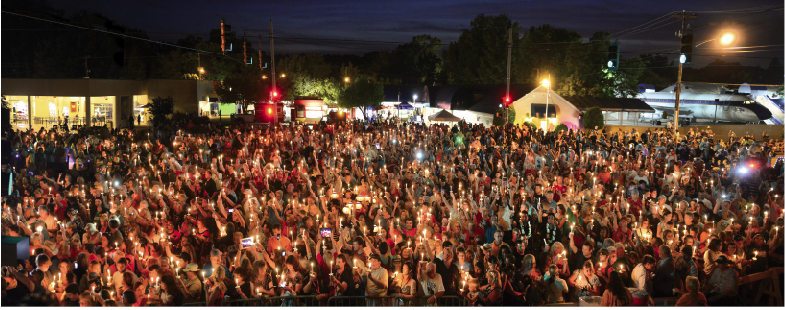
Fans gather at Graceland to commemorate the 40th anniversary of the death of Elvis Presley. Photo courtesy of Graceland.
By Steve Beard-
Forty years after his tragic death, Elvis Presley remains the legendary performer that, as Bob Dylan put it, “crash landed from a burning star onto American soil.” Amazingly, he still enjoys unparalleled worldwide popularity. In August, more than 50,000 showed up on the 40th anniversary of his death to remember the rockabilly superstar. Last year, Graceland injected $137 million into a spectacular expansion in Memphis. Elvis may have left the building, but his fans have not.
Presley is one of the most pivotal and enigmatic pop culture figures in American history. As a young man, he was raised in poverty and southern Pentecostalism. He attended a conservative Assemblies of God church, but would often sneak off to listen to the music and preaching at a black church less than a mile away. Although best known for the swivel of his hips, Elvis loved gospel music and dreamed of singing it professionally. His career launched at Sun Records, however, took him on a different trajectory – the pinnacle of rock ‘n’ roll stardom.
When Elvis rolled into Jacksonville, Florida, on August 10, 1956, Judge Marion Gooding had prepared an arrest warrant for Presley, charging him with impairing the morals of minors in the event that Elvis shook his hips. Young people at the Murray Hill Methodist Church heard Elvis denounced in a sermon titled, “Hotrods, Reefers, and Rock and Roll.” Elsewhere in town, Robert Gray, pastor of Trinity Baptist Church, offered up prayers for Presley’s salvation after declaring that the singer had “achieved a new low in spiritual degeneracy.”
The Rev. Gray gained national notoriety after being featured in Life magazine. Elvis later confessed frustration at the preacher’s actions. “I think that hurt me more than anything else at first. This man was supposed to be a religious leader, yet he acted that way without ever knowing who I was or what I was like,” said Presley. “I believe in the Bible. I believe that all good things come from God…I don’t believe I’d sing the way I do if God hadn’t wanted me to. My voice is God’s will, not mine.”
In the midst of remarkable fame and fortune, he struggled to find his way. After the Easter service at First Assembly of God in Memphis in 1958, Elvis told the Rev. James Hamill, “Pastor, I’m the most miserable young man you’ve ever seen. I’ve got all the money I’ll ever need to spend. I’ve got millions of fans. I’ve got friends. But I’m doing what you taught me not to do, and I’m not doing the things you taught me to do.”
Elvis told his friend Pat Boone, “I wish I could go to church like you.” After Boone told him he could, Elvis replied, “No, they wouldn’t leave me alone. I would distract the minister.” Acknowledging the potential difficulty, Boone told me many years ago that he assured Elvis that “if they see that you are coming for the same reason that they are, all of that would ease away and you could actually worship freely like everybody else. And it would do you a world of good, Elvis.” According to Boone, Elvis “felt like he couldn’t go anywhere in public. So he was sort of imprisoned. I felt like he lived like Public Enemy #1 instead of the King of Rock ‘n’ Roll. It stunted his social and spiritual growth.”
Like so many other young Americans during the 1960s, Elvis explored exotic Eastern religions and experimented with drugs. He was, by all accounts, an eccentric religious seeker on turbo drive. One man who seemed to tap into that spiritual desire was a 24-year-old hairdresser named Larry Geller who told Elvis that he was most interested in discovering three things: “where we come from, why we are here, and where we are going.” This was the key to unlocking Elvis’s attention. “Whoa, whoa, man. Larry, I don’t believe it. I mean, what you’re talking about is what I secretly think about all the time,” said Presley.
Those were the kinds of transcendent questions that haunted Elvis’s soul. He saw through the shallowness of stardom,
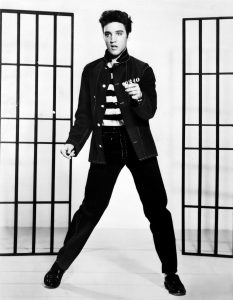
Elvis Presley publicity photo in 1957 for Jailhouse Rock, MGM
but was a prisoner to his own success. In turn, Elvis consumed books on Hinduism, Judaism, numerology, Theosophy, positive thinking, the new-age, and meditation. Although he explored and researched many diverse religions and practices, he never abandoned his faith in Christianity. He was a true believer, but he also had the appetite of a spiritually starved sojourner.
“All I want is to know the truth, to know and experience God,” Elvis said. “I’m a searcher, that’s what I’m all about.”
Throughout Presley’s life, gospel music was the constant element of solace to the man who was burning the candle at both ends. He would spend hours singing gospel with his friends around a piano after his shows. The only Grammy awards he earned were with his gospel records. To many fans, he is as well known for “How Great Thou Art” as he is for “Blue Suede Shoes.”
It was the sequined jumpsuit Vegas years in the 1970s that seemed to drain so much of Elvis’s vibrancy. Presley struggled with womanizing, pill-popping, reclusiveness, and uncontrollable weight gain. He turned to uppers, downers, and painkillers to dull the ache of depression and loneliness. Fame was a wicked mistress and Elvis and his entire entourage knew it. Even then, however, he tried to keep his head above water.
As if to reconnect with his faith, Elvis hired gospel groups such as the Imperials, the Sweet Inspirations, and J.D. Sumner and the Stamps to sing back-up for him while he was in Las Vegas. Surrounded by all of the glittery temptations that Sin City had to offer, Elvis appeared to want to provide a glimpse of the sacred – for his audience or, more importantly, for himself.
It would be a mistake to describe what went on in the Vegas shows as a revival meeting under neon lights. Nevertheless, Presley appeared to be hungering for the security and peace that he found in the faith of his younger years. He was one of the only rock performers who recorded religious music – crossing back and forth over the divide between the secular and the sacred.
Gospel singer J.D. Sumner tells of a woman approaching the stage in Vegas with a crown sitting atop a pillow. “It’s for you,” the woman told Elvis. “You’re the King.” He took her hand, smiled, and told her, “No honey, I’m not the King. Christ is the King. I’m just a singer.”
In December 1976, Elvis requested that the Rev. Rex Humbard (1919-2007), a popular television minister, and his wife Maude Aimee meet with him backstage in Las Vegas in between sets. “Jesus is coming back really soon, isn’t he, Rex?” Elvis said as he began quoting all kinds of Scriptures about the Second Coming. “It really shocked me that Elvis knew all of those Scriptures from the Old and New Testaments about the Lord’s return,” Humbard told me in an interview in 2002.
Elvis, Maude Aimee, Rex, and J.D. Sumner were sequestered into a large closet in order to have some privacy and speak about spiritual matters. “I could see he was reaching back to his childhood when he used to play his guitar and go to church and sing church songs,” recalled Humbard. “And I could see he was reaching back to the past – that spirituality, that feeling that he had years and years before that had been planted in his heart.”
Maude Aimee told Elvis about her prayer that he would fully rededicate his life to God. According to Humbard, “Elvis went all to pieces. He started crying. She shook him up by that statement.” As the four of them held hands and prayed, “he rededicated his heart to the Lord,” recalled Humbard. “I asked God to bless him and to send His spirit into his heart and meet his every need.” During the evening’s second show, Elvis dedicated “How Great Thou Art” to the Humbards.
To be clear, Elvis was dealing with a runaway trainload of emotional, physical, and spiritual issues during his time in Vegas. Elvis was not a saint, and no one knew that better than Presley himself. He was an enigma who touched a spiritual and cultural nerve in American culture. There is, of course, no one else on the planet who can attract more than 50,000 fans to his gravesite to recognize the 40th anniversary of his death. At previous memorial events, fans recited the Lord’s Prayer, repeated the 23rd Psalm, and joined together in singing “How Great Thou Art.”
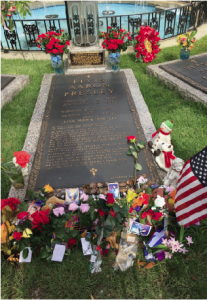
Elvis Presley’s grave at Graceland. Photo by Steve Beard.
When he died, Elvis had fourteen different drugs active in his system. There are plenty of lessons to be gleaned from his tragic death but they should be absorbed through the prism of sorrow, grace, and gratitude. To millions of fans, his life was a spectacular gift – a concoction of rockabilly, gospel, and soul.
At his funeral, the main address was given by the Rev. C.W. Bradley, minister of the Wooddale Church of Christ in Memphis. He spoke of Elvis’s determination, decency, and his love of family. Bradley also acknowledged that Elvis was a “frail human being” and that “he would be the first to admit his weakness. Perhaps because of his rapid rise to fame and fortune he was thrown into temptations that some never experience. Elvis would not want anyone to think that he had no flaws or faults. But now that he’s gone, I find it more helpful to remember his good qualities, and I hope you do too.” His fans – saints and sinners alike – understood that.
The way in which a person dies is not always the best way to remember the pulse of their life. All of us have seasons of our lives that we would sooner forget. It is a worthwhile endeavor to work on extending mercy to others in the same way that we trust the good Lord will extend it to us. We could all use a little trip to “graceland,” even when we are remembering Elvis.
Steve Beard is the editor of Good News. This article is adapted from the original that appeared in Risen Magazine in 2002.

by Steve | Sep 15, 2017 | Magazine, Magazine Articles, September/October 2017
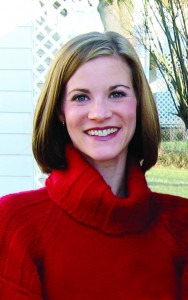
Reed Hoppe
By Reed Hoppe-
How do you find hope in a place like South Sudan?
Dr. Sharon Fogleman, a missionary to South Sudan with TMS Global, asked this question when she addressed our staff one morning. As Christians, we often talk about having our hope in Christ. Yet when your country is enveloped in civil war, your children are starving, and you have been forced to travel a long and dangerous journey to a refugee camp, what does your faith look like? How do you find hope when you have lost everything?
Doctors Lynn and Sharon Fogleman moved to South Sudan in 2012, soon after the country gained independence. Both family physicians, Lynn and Sharon taught a Community Health and Disease Prevention program within The United Methodist Church of South Sudan.
Although violence was a common part of life in this new country, the team resided in Yei, which remained relatively safe. That changed in 2016 when tension between government and rebel forces increased dramatically. “Government soldiers were raping people, looting businesses, burning homes, and killing anyone they found who sided with the rebels,” said Lynn. “The rebels were doing the same thing, so travel beyond our town became very unsafe.”
The Foglemans’ good friend and fellow missionary, Sister Veronica of St. Bahkita Hospital, was killed in May of 2016. A Catholic nun and a physician, she was traveling home by ambulance after taking a patient to the hospital. Soldiers ambushed the ambulance and shot her.
That July, the TMS Global team made the difficult decision to leave Yei. They each packed a small bag and made the dangerous drive to the border, which was closed an hour after they crossed into Uganda. The war has caused more than 1.6 million South Sudanese to leave the country as refugees, and an additional 1.9 million people to be internally displaced. Most have fled to Uganda, where more than 850,000 people are residing in refugee camps, a number which is expected to rise to more than one million by the end of the year.
Many South Sudanese are subsistence farmers who have been unable to tend their crops due to the fighting. The addition of a drought plaguing the area has led to an estimated 100,000 people living in famine, and 40 percent of the population is facing extreme hunger. Aid organizations are desperately trying to get food to people who need it, but the fighting has blocked some areas from receiving aid.
After fleeing South Sudan, the TMS Global team settled in Uganda and is serving in refugee camps on the border. Lynn, Sharon, and Carolyn, a retired nurse, have been joined in Uganda by Nancy, a former hospital CEO and respiratory therapist.
In the camp, TMS Global workers are providing medical care and healthcare education, and are discipling Christians in their faith. Carolyn was recently trained in biblically based trauma counseling in order to minister to residents. She is also training South Sudanese pastors at the camp so that more people can receive counseling.
“Soon after they arrived at the refugee camp, Christians had pulled together and were helping one another,” said Sharon. “Their resilience was amazing. They had set up a compound of tents for the 36 orphans from the children’s homes in Yei and were caring for them. The community radiated hope.
“While we were talking to the children, one of the leaders asked the kids to say what they wanted to be when they grew up. They each stood up with a smile on their face and listed teacher, doctor, driver, mechanic, and other professions. The leaders were not going to let these kids stop dreaming of their future. There we saw hope.
“Although South Sudan is in a very dark place right now, we still see hope. The Christians in South Sudan know that Jesus is their only hope, and that is what they cling to. Join us in praying for peace in South Sudan.”
Reed Hoppe is the associate director of communications for TMS Global – www.TMS-Global.org.


 (Jude 3). Rather, its purpose is to teach us universal truths about the nature of human existence. Take, for example, his summary of Paul’s message: “The apostle Paul is stoking a movement, spreading this intoxicating message that there’s another way to be in the world, that the good news of Jesus is about human dignity and goodness.” How he determines this to be Paul’s central message is a mystery. Much more prominent in Paul’s writings are themes of human sinfulness, the salvation available to us through Christ’s death on the cross, and our resurrection from the dead, of which Christ is the firstfruits. Bell criticizes readers of the Bible who are “constantly comparing what they’re reading to what they have already decided about who God is and what God is like.” In this case, one might respond with the old proverb, “Physician, heal thyself.”
(Jude 3). Rather, its purpose is to teach us universal truths about the nature of human existence. Take, for example, his summary of Paul’s message: “The apostle Paul is stoking a movement, spreading this intoxicating message that there’s another way to be in the world, that the good news of Jesus is about human dignity and goodness.” How he determines this to be Paul’s central message is a mystery. Much more prominent in Paul’s writings are themes of human sinfulness, the salvation available to us through Christ’s death on the cross, and our resurrection from the dead, of which Christ is the firstfruits. Bell criticizes readers of the Bible who are “constantly comparing what they’re reading to what they have already decided about who God is and what God is like.” In this case, one might respond with the old proverb, “Physician, heal thyself.” 








